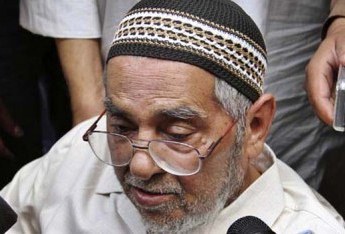
New Delhi, December 12: Pakistani microbiologist Mohammed Khalil Chishti was today acquitted by the Supreme Court of the murder charge in a 20-year-old criminal case and was allowed to return to home without any restriction.
However, the apex court declined to interfere with his conviction for voluntarily causing hurt under section 324 of the Indian Penal Code and served him with the sentence already undergone by him in prison.
A bench of justices P Sathasivam and Ranjan Gogoi noted that 82-year-old Chishti was in the jail for almost one year during his stay in the country and "ends of justice will be met by serving him with the period of imprisonment already undergone".
While clearing him of the murder charge, the bench said there was no scope for applying section 34 of the IPC which deals with the offence of common intention.
The bench directed the authorities to return to Chishti all documents including his passport and said he was free to return to Pakistan without any restriction.
The bench, which considered the age and qualification of Chishti, directed the authorities to take all possible steps for his "smooth return" home.
The bench also referred to its May 10 order and said since no further proceeding is required against him, the surety of Rs five lakh be released to him or his nominee.
On May 10, the apex court had asked Chishti to deposit his passport and furnish as security Rs five lakh in cash within two weeks before the Supreme Court registry.
The other two accused in the case were also held guilty only under section 324 of IPC and were directed to be released forthwith.
The apex court said it was left with "no reliable evidence" in the case as the prosecution had come out with two sets of version of the crime and two sets of evidence which were contradictory.
Earlier on May 4, the Supreme Court had agreed to hear Chishti's plea to visit his country and had sought the Centre's response to it.
Chishti had been granted bail by the apex court on April 9. Held guilty in a 20-year-old murder case, he had been serving life term in a Rajasthan's Ajmer jail.
The court had granted bail to Chishti on humanitarian grounds, but had asked him not to leave Ajmer till further orders.
Although the Centre had objected to Chishti visiting Pakistan temporarily saying he may not return to India, the apex court had allowed him to pay a visit to Pakistan.
Chishti had come to see his ailing mother in 1992 when he got embroiled in a brawl, and, in the ensuing melee, one of his neighbours was shot dead while his nephew got injured.
Born in Ajmer to a prosperous family of caretakers of the Khwaja Moinuddin Chishti shrine, Chishti was studying in Pakistan at the time of partition in 1947 and chose to stay there.
After a prolonged trial that stretched 18 years, Chishti was held guilty in the murder case and was awarded life sentence on January 31, last year by an Ajmer sessions court.
He had earlier also been granted bail by the sessions court during the trial but was ordered not to leave Ajmer. He was re-arrested to serve the sentence after he was convicted.
Chishti, who suffers from heart, hearing and other ailments, had lived in his brother's poultry farm till his conviction.
His case came to light when Justice Markandey Katju, the then Supreme Court judge, wrote to Prime Minister Manmohan Singh urging that the Pakistani national be pardoned on humanitarian grounds.
An eminent professor in Karachi Medical College, Chishti holds a PhD from Edinburgh University.





Comments
Add new comment